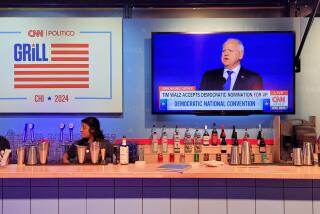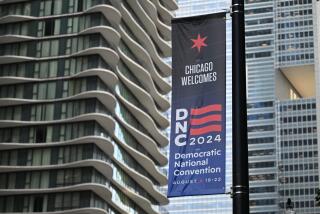Bloggers Are the Sizzle, Not the Steak
- Share via
The Democrats and the Republicans are inviting a limited number of bloggers -- those witty, candid, irreverent, passionate, shrewd and outrageous Internet chroniclers -- to their 2004 conventions. It’s a gesture of respect for the growing influence of the blogosphere, and if ever there were events ideally suited to bloggers, the heavily scripted and tensionless conventions top the list.
But make no mistake, this moment of blogging legitimization -- and temporary press credentials -- doesn’t turn bloggers into journalists.
Political conventions have become festivals of faux harmony and candidate image-building, which makes them marvelous targets for blogging’s candor, intelligence and righteous wrath.
However, bloggers, with few exceptions, don’t add reporting to the personal views they post online, and they see journalism as bound by norms and standards that they reject. That encourages these common attributes of the blogosphere: vulgarity, scorching insults, bitter denunciations, one-sided arguments, erroneous assertions and the array of qualities that might be expected from a blustering know-it-all in a bar.
Both parties will have spent millions on their conventions in order to make their best case to the American people, and they hope that the mainstream media will simply turn on the cameras and step back. One could even make a good argument that at conventions the media should just shut up and get out of the way, so that the message could go out -- for once -- unfiltered and unexamined. Even in this year of high contentiousness, the mainstream media have already announced that there won’t be anything like gavel-to-gavel news coverage, and they will probably be gentle in their reporting.
Presumably many Americans, especially young ones, will look for something with more spice and feistiness, which means they may well be looking at blogs and no doubt adding their own kibitzing via the medium’s famed interactivity. This can be fun, and it can also be important. It was political bloggers and their fans who insulted and harassed and eventually embarrassed the major media into paying attention to the comments suggesting racism that Mississippi’s Sen. Trent Lott made at South Carolina Sen. Strom Thurmond’s 100th birthday party. Media coverage forced Lott’s resignation as Republican leader in the Senate, but it was bloggers who badgered the media until they did their job.
Journalists increasingly read blogs to pick up tips. Blogs have become a network of capillaries that feed the nation’s veins of information. For that reason, blogging’s freewheeling, unfettered style makes it a juicy target for manipulation.
In these early days, blogging still has the charm of guileless transparency, which in the blogosphere means that everyone -- no matter how cranky or hysterical -- is presumed to be speaking his or her mind with sincerity. It is this air of conviction that makes bloggers such potent advocates.
However, if history is any indicator, such earnestness will attract those who would exploit it, and they include some canny, inventive people. There is already talk of bloggers who would consider publishing items for cash and commercial blogs that tout products.
Blogging is especially amenable to introducing negative information into the news stream and for circulating rumors as fact. Blogging’s fact-checking apparatus is just the built-in truth squad of those who read the blog and howl loudly if they wish to dispute some assertion. It is, in a sense, a place where everyone has his own truth.
With the status conferred by convention credentials, blogging has arrived as an engaging, important new player in the information carnival. But should blogging displace traditional reporting and journalism, as some in the blogosphere predict it will, then the steak will have been swapped for the sizzle. It’s better to have both.
Alex S. Jones is director of the Shorenstein Center on the Press, Politics and Public Policy at Harvard’s Kennedy School of Government.
More to Read
Get the L.A. Times Politics newsletter
Deeply reported insights into legislation, politics and policy from Sacramento, Washington and beyond. In your inbox twice per week.
You may occasionally receive promotional content from the Los Angeles Times.










